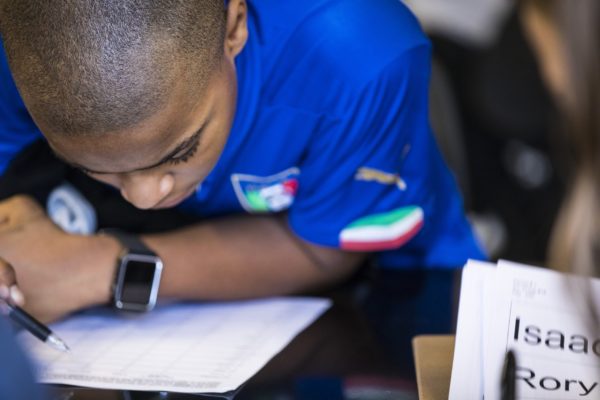
What would happen if school and district leaders used students’ experiences and perspectives as the basis for their leadership? In CEL’s partnerships with school systems, we ask leaders to focus on the experiences of students furthest from justice in their schools and districts. We think hearing about students’ histories, ideas and experiences can shift how leaders envision equitable schools and point to tangible ways for leaders to support educational justice.
Students’ experiences can be powerful data for transforming teaching and learning. In her classic 1994 article Beyond the Methods Fetish: Toward a Humanizing Pedagogy, Lilia Bartolomé describes how attending to student experience prompted significant changes for one veteran special education teacher. The teacher previously relied on traditional closed-ended tests to diagnose students’ weaknesses and design interventions targeting discrete skills. For Bartolomé’s university course, the teacher instead observed one student, collected the student’s poems and stories, and conducted reading conferences to investigate the student’s understandings and ideas. Bartolomé recounts how these open-ended activities provided the teacher with insight into her student’s writing strengths and weaknesses and approach to reading, but also opened a window into his life experiences and perspectives.
Bartolomé notes that investigating her student’s experiences helped the teacher tailor instruction to her student’s academic needs and personal assets. But more importantly, the teacher recognized the value in her student’s life experiences and background knowledge. Rather than viewing her student as a conglomeration of skills (or skill gaps), the teacher saw him as a person with a complex identity and relevant ideas about his own learning.
Bartolomé’s story illustrates the potential of humanizing pedagogy, an approach to teaching and learning based on Paulo Freire’s (1970) ideas about liberatory education that honors and draws on students’ realities, histories, and experiences to create high-quality, equitable learning opportunities. Bartolomé wrote this article almost 30 years ago, yet her argument that educators must cultivate learning environments that position Black, Indigenous, Latinx and other marginalized students as active protagonists in their own learning stories is equally important today.
In the 4 Dimensions of School Leadership™ and through CEL’s professional learning for Leading Equitable Schools, we encourage leaders to look beyond technical fixes toward a humanizing approach. Alongside our partners, we’re exploring how leaders create more humanizing school experiences for students furthest from justice by transforming their practices, their interactions with others, and the ways their schools operate. Here are three practices we think are crucial:
1 – Listen to students
Equitable, humanizing teaching and learning will vary depending on the desires, histories, and strengths of particular students and communities. So, how will leaders know whether students feel empowered or disenfranchised in their learning environments? Collaborating with teachers and observing in classrooms highlights teachers’ intentions, but understanding the impacts of a teachers’ work requires student feedback. Listening to students’ stories and ideas provides insight into how students’ racial and cultural identities intersect with their classroom learning. As a leadership practice, active listening can be challenging. It requires leaders to push aside preconceived ideas and check the impulse to brainstorm solutions. To gather authentic stories, leaders must also cultivate trusting relationships and communicate authentic curiosity through their everyday interactions with students and families.
2 – Focus on learning contexts
Learning is social and emotional, and every student’s ability to learn is affected by their environment. As much as teachers and leaders wish they could shelter students from racism and other injustices, these forces shape how students feel about and experience classroom learning. It is vital for leaders and teachers to pay attention to how race and other social forces shape students’ engagement with academic content and classroom interactions. For example, how does race and racism shape student experiences learning mathematics in one specific classroom? How does unequal social status across student groups with different home languages shape literacy learning in a particular school? Acknowledging and naming power dynamics that shape students’ learning environments helps leaders challenge deficit-based assumptions (including their own!), to ensure that marginalized students understand that they are capable, valued members of the learning community.
3 – Craft a vision of teaching, learning and leadership around ideal student experiences
Beyond paying attention to students’ current experiences, humanizing leadership means envisioning new forms of teaching and learning and taking action to realize that vision. In the same way that looking into her students’ experiences prompted the teacher in Bartolomé’s story to shift her perspective and her practices, leaders can support educators to reflect and re-imagine their work. Leaders can design staff learning around creating a vision for teaching and learning informed by stories and ideas collected from students. Focusing on students who identify as Black, Indigneous, and Latinx or bring a range of marginalized identities, leaders and teachers together might imagine classrooms and schools that help students feel both academically successful and socially and culturally valued. This shared vision can direct how a school or school system approaches instruction to bring about the rich learning experiences students deserve.
If you’re interested in learning about processes and tools for using student experience to lead instructional change, please join CEL’s Michele Mason and Max Silverman virtually at the Learning Forward Annual Conference. On December 6th (8:15 am – 10:15 am pacific) they will be joined by Henry Strom and José Rivera of Grandview School District and Kevin Chase of Educational Service District 105 for The Students Will Lead Us: Using Student Experience as a Driver for Leading for Equity (Session #1208).
